What is Crypto SEO and Why is it Important?
Crypto SEO is a specialized approach to search engine optimization designed to improve the online visibility of cryptocurrency projects. With high competition and regulatory challenges, SEO for crypto is crucial for attracting investors, traders, and users to crypto exchanges, wallets, and blockchain startups.
Unlike traditional industries, the cryptocurrency market is highly volatile and faces strict legal restrictions. This means SEO cryptocurrency strategies must be adaptive, data-driven, and focused on long-term organic growth. Securing top search rankings builds trust, increases traffic, and reduces dependency on paid ads.
A well-executed SEO crypto strategy helps websites rank higher in search results, making them more accessible to potential users. It also reduces customer acquisition costs, making it a cost-effective alternative to paid marketing. In an industry where trust is critical, strong SEO signals help build credibility and authority. Since many advertising platforms restrict crypto-related ads, organic search traffic becomes one of the most reliable ways to attract an audience. A properly optimized site ensures a better user experience, increasing engagement and conversion rates.
Ignoring SEO for crypto means relying solely on short-term advertising or word-of-mouth, which limits growth and sustainability. A strong presence in search results enhances long-term visibility and competitiveness, helping projects survive in a rapidly evolving market.
How Crypto SEO Differs from Traditional SEO
Crypto SEO differs from traditional SEO in several key aspects. One of the biggest differences is the level of competition. The cryptocurrency industry is filled with thousands of startups, exchanges, and blockchain projects, all competing for visibility. This makes ranking for high-value keywords extremely difficult. Search engines also impose stricter policies on crypto-related content, leading to additional challenges in ranking and content approval.
Another major difference is the legal and regulatory landscape. Many countries have strict rules regarding cryptocurrency promotions, making compliance essential for any SEO cryptocurrency strategy. Unlike other industries, crypto businesses must carefully craft their content to avoid legal risks while still maintaining engagement and authority.
The volatility of the crypto market also impacts SEO for crypto. Trends change rapidly, and keywords that are relevant today may lose popularity within weeks. This requires constant monitoring and adaptation of SEO strategies to align with the latest market trends. Unlike traditional SEO, where keyword research remains relatively stable, crypto SEO demands continuous updates and real-time adjustments.
Blockchain technology itself presents unique technical SEO challenges. Many crypto websites rely on decentralized applications (dApps) and blockchain integrations, which can slow down page loading speeds and affect user experience. Optimizing site performance is a critical part of any crypto SEO services, ensuring that users can access information quickly and efficiently.
Another distinction is the role of community engagement. Unlike other industries, crypto projects rely heavily on communities formed on platforms like Twitter, Telegram, and Discord. A strong presence on these platforms can significantly boost a website’s authority, influencing search rankings. Traditional businesses can rely on conventional backlinks, but crypto businesses often need to build trust through active community participation and discussions.
Because of these differences, a dedicated crypto SEO agency understands how to navigate industry-specific challenges. A well-planned SEO strategy tailored to crypto businesses increases search engine visibility and ensures long-term sustainability.
Best Crypto SEO Strategies to Rank Higher
Effective SEO crypto strategies require a combination of keyword optimization, technical improvements, and authoritative backlinks. The first step is conducting in-depth keyword research. Identifying high-volume and long-tail keywords helps businesses target the right audience. Since cryptocurrency topics are highly dynamic, keyword trends need to be monitored regularly to stay relevant.
On-page SEO plays a critical role in ranking higher. Optimizing meta tags, headers, and URLs ensures search engines understand the content. Using structured data markup enhances visibility in search results, helping crypto websites stand out. Quality content is another essential element. Publishing informative blog posts, guides, and news articles builds credibility and encourages organic traffic.
Technical SEO improvements can significantly impact rankings. A fast-loading website improves user experience and reduces bounce rates. Mobile optimization is crucial, as a large percentage of crypto users access websites through smartphones. Secure connections via HTTPS protect users and build trust, which is particularly important in the crypto industry.
Off-page SEO strategies also contribute to ranking higher. Earning backlinks from authoritative crypto websites strengthens domain authority. Social media signals and community engagement enhance brand recognition, increasing the likelihood of ranking higher. A strong backlink profile is essential for long-term success.
Partnering with a crypto SEO agency can provide professional insights and ensure a competitive advantage. Experts in crypto SEO service offerings understand how to create optimized content, generate high-quality backlinks, and implement effective strategies for long-term success. Without a well-planned SEO strategy, crypto businesses risk losing potential traffic to competitors with stronger search engine presence.

Keyword Research for Crypto Websites
Finding the Right Crypto Keywords
Effective keyword research is the foundation of any successful crypto SEO strategy. Identifying the right keywords allows cryptocurrency businesses to attract highly targeted traffic, ensuring that potential investors, traders, and users can find relevant content. Unlike general industries, crypto-related search terms are highly competitive, requiring a strategic approach to keyword selection.
The first step in keyword research for crypto websites is understanding the intent behind user searches. Informational keywords, such as “what is Bitcoin?” or “how does blockchain work?” attract users seeking knowledge. Transactional keywords, such as “buy Bitcoin online” or “best crypto exchange,” indicate a user’s intent to take action. Navigational keywords, such as “Binance login” or “Coinbase fees,” are used to find specific brands or services.
To find the right crypto keywords, analyzing competitors is crucial. Leading cryptocurrency exchanges, wallets, and blockchain platforms rank for high-value keywords, providing insights into which terms generate the most traffic. Examining their content strategies and backlink profiles reveals keyword gaps and opportunities for optimization.
Another key factor in selecting the best keywords for SEO for crypto is search volume and keyword difficulty. High-volume keywords generate significant traffic but are often highly competitive. Lower-volume keywords with less competition, particularly long-tail keywords, provide an opportunity for ranking faster and attracting niche audiences. By balancing high-volume and long-tail keywords, crypto websites can achieve steady growth in search engine rankings.
| Keyword Type | Search Terms | Importance |
| Transactional | best crypto exchange | High |
| Transactional | buy Bitcoin with credit card | High |
| Transactional | low-fee crypto trading | Medium |
| Informational | what is blockchain technology | High |
| Informational | how to stake Ethereum | Medium |
| Informational | best crypto SEO strategies | High |
| Navigational | Coinbase login | Medium |
| Navigational | Binance trading fees | Low |
| Navigational | MetaMask wallet setup | Medium |
This table categorizes crypto-related keywords by type and importance, helping to prioritize SEO efforts based on user intent and competition level.
Best Tools for Crypto SEO Keyword Research
Using the right SEO tools simplifies the keyword research process and provides accurate data for decision-making. Several industry-leading platforms help cryptocurrency websites discover valuable keywords, analyze competitors, and track search trends.
Google Keyword Planner is a fundamental tool that provides search volume data and competition levels for keywords related to SEO cryptocurrency. Although originally designed for paid search campaigns, it offers insights into which terms attract the most searches.
Ahrefs is a powerful SEO tool that provides in-depth keyword analysis, backlink tracking, and competitor research. Crypto businesses can identify high-ranking keywords, analyze search difficulty, and discover content gaps. Ahrefs’ Keyword Explorer feature is particularly useful for identifying trending crypto-related terms.
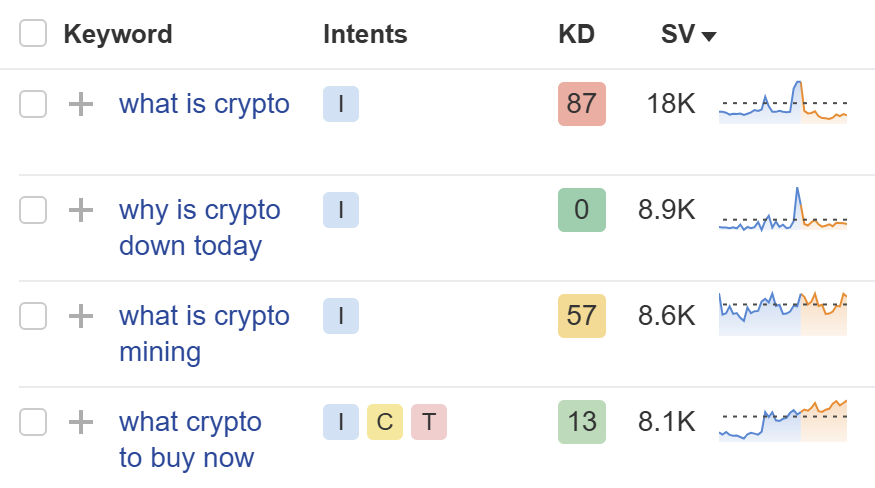
SEMrush is another comprehensive SEO platform that helps crypto websites analyze keyword trends, track rankings, and monitor competitors. It offers a dedicated Keyword Magic Tool, which provides thousands of keyword variations based on a primary search term.
Moz provides keyword research and SEO analytics, offering valuable insights into domain authority and keyword rankings. Its Keyword Explorer tool helps crypto websites find long-tail opportunities and assess keyword difficulty.
Google Trends is essential for tracking the popularity of cryptocurrency-related terms over time. Since the crypto market is highly volatile, search trends change frequently. Monitoring fluctuations in keyword interest helps websites adjust their SEO strategies accordingly.
By leveraging these tools, cryptocurrency websites can optimize their keyword strategies, ensuring they target the most relevant and high-performing search terms. Using a combination of multiple platforms provides a well-rounded approach to crypto SEO, maximizing visibility and engagement.
| Tool Name | Pros | Cons | Summary |
| Google Keyword Planner | Free to use, accurate search volume data, keyword suggestions | Requires Google Ads account, limited for crypto keywords | Good for basic keyword research but limited in the crypto niche. |
| Ahrefs | Comprehensive backlink analysis, keyword difficulty score, competitor tracking | Expensive, steep learning curve for beginners | Powerful for competitive research and link building. Best for advanced SEO. |
| SEMrush | Strong keyword database, competitive research, SEO audits | Subscription-based, data can sometimes be outdated | Great for overall SEO management but requires ongoing investment. |
| Moz | Domain authority tracking, keyword research, link analysis | Limited free access, fewer features than competitors | Useful for tracking domain authority but lacks deep analytics. |
| Google Trends | Tracks keyword popularity over time, identifies trending topics, free to use | No search volume data, only shows trends, lacks detailed insights | Best for identifying keyword trends but not for volume estimation. |
Long-Tail Keywords for Niche Crypto Markets
Long-tail keywords play a vital role in SEO for crypto by targeting specific user queries with lower competition. Unlike broad terms such as “crypto exchange” or “Bitcoin trading,” long-tail keywords are more detailed and focused, making them easier to rank for.
For example, a high-competition keyword like “crypto wallet” may be difficult to rank on the first page of Google. However, a long-tail keyword such as “best non-custodial crypto wallet for beginners” has lower competition while still attracting highly relevant traffic. Since long-tail keywords indicate clear user intent, they often lead to higher conversion rates.
Niche crypto markets, such as decentralized finance (DeFi), non-fungible tokens (NFTs), and blockchain gaming, benefit greatly from long-tail keywords. As these sectors evolve, new keyword opportunities emerge. Staying ahead of trends and identifying underserved queries allows crypto businesses to establish authority in emerging markets.
Voice search optimization further increases the importance of long-tail keywords. As more users rely on voice assistants to search for cryptocurrency-related information, natural language queries become more common. Phrases like “how to stake Ethereum on a hardware wallet” or “which crypto exchange has the lowest fees” align with how people speak, making them valuable for SEO cryptocurrency strategies.
Integrating long-tail keywords into content, blog posts, and FAQs enhances search visibility and attracts engaged users. By focusing on specific, high-intent queries, crypto websites can secure valuable traffic and establish themselves as authoritative sources in the industry.
On-Page SEO for Crypto Businesses
| On-Page SEO Element | How To Use? | Why Is It Important? |
| Title Tags | Include primary keywords naturally and keep it under 60 characters. | Helps search engines and users understand page content at a glance. |
| Meta Descriptions | Write compelling, keyword-rich descriptions under 160 characters. | Increases click-through rates (CTR) from search engine results pages. |
| Header Tags (H1, H2, H3) | Use structured headings to improve readability and keyword relevance. | Enhances content structure, making it easier for users and crawlers. |
| Keyword Optimization | Integrate crypto-related keywords naturally throughout the content. | Boosts relevance and rankings for crypto-related search queries. |
| Internal Linking | Link to relevant internal pages to enhance navigation and SEO value. | Improves user experience and helps distribute ranking power across the site. |
| Image Optimization | Compress images and use descriptive alt text for better indexing. | Enhances page speed and accessibility for search engines and users. |
| Mobile Optimization | Ensure a responsive design that adapts to different screen sizes. | Improves user experience and supports Google’s mobile-first indexing. |
| Page Load Speed | Optimize images, use caching, and minimize scripts for faster loading. | Affects ranking, user engagement, and bounce rates. |
| Structured Data Markup | Implement schema markup to help search engines understand content. | Enhances visibility in search results and improves rich snippets. |
| URL Structure | Use short, keyword-rich, and descriptive URLs for better indexing. | Ensures clarity, improves SEO rankings, and enhances user experience. |
Optimizing Meta Tags and Descriptions
Meta tags and descriptions play a crucial role in crypto SEO by helping search engines understand a website’s content and influencing click-through rates. Well-optimized meta tags improve rankings and make crypto-related pages more attractive to users in search results.
Title tags should include the primary keyword as close to the beginning as possible. A strong title for a crypto website might be: “Crypto SEO Agency – Best SEO Service for Cryptocurrency Websites”. Keeping the title under 60 characters ensures that it is fully displayed in search results.
Meta descriptions provide a summary of the page content and should also include relevant keywords. A well-crafted description for a crypto SEO service page could be: “Boost your crypto website’s rankings with expert SEO for cryptocurrency businesses. Improve visibility and drive more traffic today.” Descriptions should be concise, around 150-160 characters, and encourage users to click by highlighting unique benefits.
Header tags structure the content, making it easier for search engines and users to read. Using H1, H2, and H3 tags correctly enhances readability and SEO performance. The H1 tag should contain the main keyword, while H2 and H3 tags should support the primary topic with related keywords.
Optimizing images with alt text improves accessibility and helps search engines index visual content. Crypto websites often include charts, infographics, and logos, all of which should have descriptive alt text, such as “Bitcoin SEO ranking growth chart” or “SEO for crypto exchanges comparison infographic”.
Internal linking strengthens a website’s structure, guiding users to relevant pages and distributing link equity across the site. Linking to high-value pages like “best crypto SEO strategies” or “top crypto SEO agency” helps search engines understand content relationships and improves ranking potential.
SEO-Friendly URLs for Crypto Websites
A well-structured URL enhances usability and improves search engine rankings. Crypto websites should use short, descriptive URLs that include keywords without unnecessary parameters. A good example of an SEO-friendly URL is:
domain-name/seo-for-crypto-businesses
This URL clearly indicates the page topic and includes relevant keywords, making it easier for search engines to index and rank. Avoiding long or complex URLs with numbers and symbols improves user experience and prevents indexing issues. A poorly structured URL, such as domain-name/page?id=12345, provides no context for search engines or users.
Using hyphens instead of underscores ensures better readability. A URL like /bitcoin-seo-guide is preferable to /bitcoin_seo_guide because Google treats underscores as word connectors, making it harder to interpret the phrase correctly.
Canonical tags prevent duplicate content issues by specifying the preferred version of a page. Crypto businesses often create multiple pages for similar topics, such as “SEO for crypto exchanges” and “Bitcoin SEO services”. Without proper canonicalization, search engines might penalize duplicate content. Defining a canonical URL ensures that search engines recognize the primary version, preserving ranking authority.
Using Schema Markup for Crypto Projects
Schema markup enhances search engine understanding of a crypto website’s content and enables rich results in Google. Adding structured data improves visibility by displaying additional information, such as ratings, FAQs, and event details, directly in search results.
A crypto website can benefit from multiple types of schema markup. Organization schema helps define company details, including the name, logo, and social media links. A properly structured organization schema for a crypto SEO agency might include:
{
“@context”: “https://schema.org”,
“@type”: “Organization”,
“name”: “Crypto SEO Agency”,
“url”: “https://domain-name.com”,
“logo”: “https://domain-name.com/logo.png”,
“sameAs”: [
“https://twitter.com/domain-name”,
“https://www.linkedin.com/company/domain-name”
]
}
FAQ schema enhances content by displaying answers to common crypto-related questions directly in search results. A page about “SEO for cryptocurrency businesses” might include structured data for frequently asked questions like:
{
“@context”: “https://schema.org”,
“@type”: “FAQPage”,
“mainEntity”: [
{
“@type”: “Question”,
“name”: “What is Crypto SEO?”,
“acceptedAnswer”: {
“@type”: “Answer”,
“text”: “Crypto SEO is the practice of optimizing cryptocurrency-related websites to improve their search engine rankings and increase organic traffic.”
}
},
{
“@type”: “Question”,
“name”: “Why is SEO important for crypto businesses?”,
“acceptedAnswer”: {
“@type”: “Answer”,
“text”: “SEO for crypto businesses helps improve visibility, attract more users, and establish credibility in a highly competitive industry.”
}
}
]
}
Breadcrumb schema enhances navigation by showing users their location on the website in search results. Crypto exchanges, wallets, and DeFi platforms benefit from structured breadcrumbs to organize content effectively.
Implementing schema markup improves search rankings by providing search engines with clearer information about crypto businesses. Enhanced search snippets increase click-through rates, driving more traffic to crypto websites. By optimizing on-page SEO elements, crypto businesses gain a competitive edge and improve their chances of ranking higher in search results.
Technical SEO for Cryptocurrency Websites
Indexing Blockchain Content and the Impact of Decentralization on Search Algorithms
Blockchain technology presents unique challenges for SEO, particularly in how search engines index decentralized content and interpret blockchain-based websites. Unlike traditional web pages stored on centralized servers, blockchain content is distributed across a decentralized network, making it harder for search engines to crawl and index efficiently.
One of the biggest challenges in indexing blockchain content comes from decentralized hosting solutions such as IPFS and Arweave. Unlike traditional URLs that point to specific locations, these systems use content-addressed storage, making it difficult for search engines to locate and re-crawl content consistently. Additionally, many blockchain platforms generate dynamic content using smart contracts, which prevents search engines from easily indexing important information. Unlike static HTML pages, on-chain data requires real-time interaction, which is not easily readable by conventional crawlers.
Backlink structures also pose a problem for blockchain SEO. Traditional search engines rely on backlinks to determine domain authority, but Web3 projects often use on-chain trust mechanisms instead of off-chain links. This weakens their ranking potential on Google, as search algorithms prioritize external link-building when determining credibility. Furthermore, most blockchain-based websites lack SEO-friendly CMS platforms, meaning that many essential optimization techniques, such as metadata management and structured data implementation, require manual coding rather than user-friendly tools like WordPress plugins.
Decentralization significantly impacts how search engines assess and rank blockchain-based content. Traditional websites build domain authority through backlinks and content longevity, while decentralized domains such as .crypto, .eth, and .dao do not yet have a standardized ranking system in Google. Many blockchain businesses address this issue by hosting Web2 mirror sites linked to their Web3 domains, bridging the gap between decentralized hosting and traditional search engine discoverability. Another major challenge is the persistence of content on blockchain networks. Unlike Web2 sites, where expired pages and deleted content disappear, blockchain-based websites store information permanently. However, Google does not re-crawl IPFS and Arweave content as frequently as traditional pages, which can result in outdated information remaining indexed for long periods.
Web3 privacy standards further complicate SEO efforts. Blockchain technology minimizes data tracking, reducing the amount of behavioral data search engines can use to personalize rankings. Traditional search engines prioritize user engagement metrics such as dwell time, click-through rates, and bounce rates to determine ranking potential. Since Web3 websites often operate without cookies and tracking scripts, these ranking signals become weaker. To counter this, blockchain projects must emphasize semantic SEO, structured data markup, and on-chain engagement metrics to remain competitive in search rankings.
Optimizing blockchain content for search engines requires a combination of Web2 and Web3 SEO strategies. Many successful crypto projects maintain Web2-hosted landing pages to ensure better indexing while linking back to their decentralized platforms for additional credibility. Implementing structured data markup using JSON-LD can help search engines understand crypto-related content, such as DeFi data, NFT metadata, and smart contract transactions. Alternative search engines such as Presearch and Cyber are emerging to support decentralized search indexing, but Web3 projects must still prioritize visibility on mainstream platforms like Google. Creating HTML-based content mirrors of smart contract interactions, such as NFT listings and DeFi staking data, also improves crawlability. Earning backlinks from authoritative Web2 crypto sources, such as CoinDesk, Binance Blog, and Decrypt, remains essential for boosting domain authority even in a decentralized environment.
As Web3 adoption grows, search engines will need to refine their indexing methods to accommodate blockchain-based content. Google’s AI-driven search updates suggest that future algorithms may be capable of interpreting decentralized website structures and on-chain transactions more effectively. Until then, crypto businesses must proactively adapt to the challenges of blockchain SEO by ensuring that their platforms remain visible and accessible in both centralized and decentralized search ecosystems.

Improving Website Speed and Performance
Website speed is a critical factor for SEO cryptocurrency strategies. A fast-loading site improves user experience, reduces bounce rates, and helps rank higher in search engine results. Crypto websites, particularly exchanges, wallets, and blockchain platforms, often handle large amounts of data, real-time transactions, and API integrations, making performance optimization essential.
Google’s Core Web Vitals provide key metrics for evaluating website speed and performance. These include Largest Contentful Paint (LCP), which measures how quickly the largest visible content loads, First Input Delay (FID), which assesses interactivity, and Cumulative Layout Shift (CLS), which tracks visual stability. Optimizing these metrics ensures a smooth user experience.
Example of good Core Web Vitals metrics:
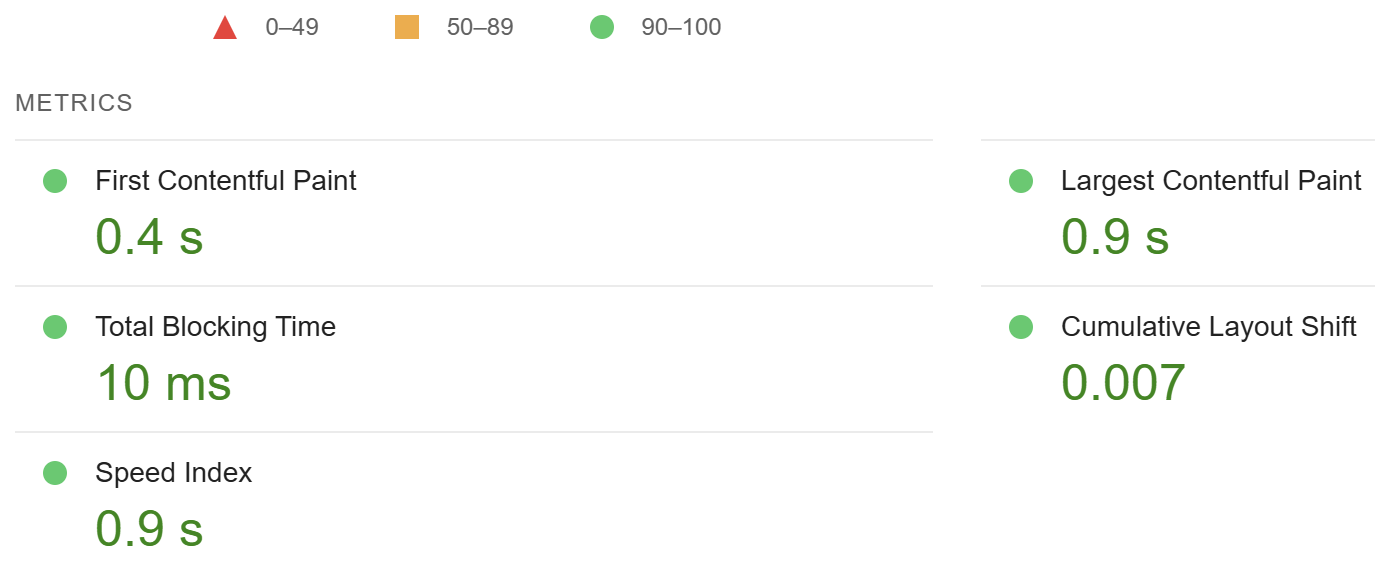
Example of poor Core Web Vitals performance:
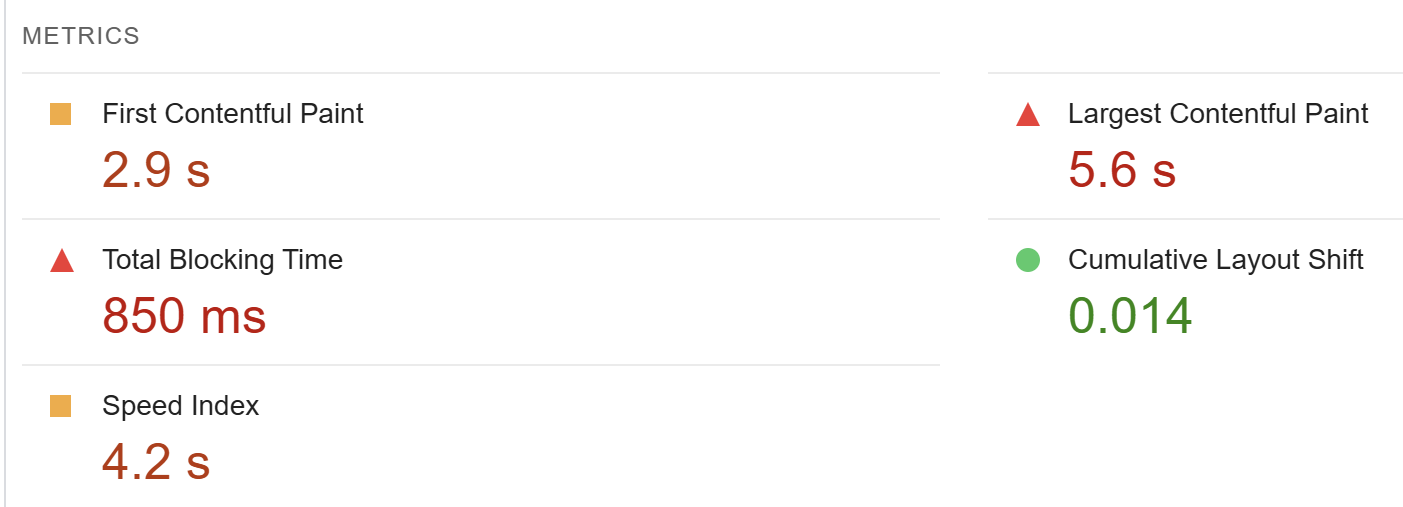
Reducing server response times by using a reliable hosting provider and a Content Delivery Network (CDN) improves website performance. A CDN distributes content across multiple global servers, reducing latency for users in different regions. Since crypto audiences are spread worldwide, CDNs help deliver faster page loads.
Minimizing JavaScript and CSS files improves loading speed. Removing unnecessary scripts, using asynchronous loading, and compressing files ensure faster rendering. Image optimization also plays a crucial role. Compressing images using tools like WebP format maintains quality while reducing file size, speeding up page load times.
Enabling caching reduces server load and improves response time. Browser caching stores frequently accessed files locally, allowing returning visitors to experience faster load times. Server-side caching, including object caching and database caching, further enhances performance for crypto websites handling large amounts of user data.
Regular performance audits using tools like Google PageSpeed Insights, GTmetrix, and Lighthouse identify bottlenecks and provide actionable recommendations. Monitoring and addressing speed issues continuously ensures that crypto websites maintain peak performance, keeping users engaged and search rankings high.
Mobile Optimization for Crypto Platforms
With a growing number of users accessing crypto platforms via mobile devices, mobile optimization is a key component of SEO for crypto. Google’s mobile-first indexing prioritizes mobile-friendly websites, making it essential for cryptocurrency businesses to ensure seamless performance across all screen sizes.
A responsive design automatically adapts website content to different devices, providing an optimal viewing experience. Crypto platforms, including exchanges and wallet applications, must ensure that their trading interfaces, transaction histories, and dashboards are fully functional on mobile screens.
Page speed is even more critical for mobile users, as slow-loading sites lead to higher abandonment rates. Reducing excessive redirects, using lightweight design elements, and compressing images improve mobile load times. Implementing Accelerated Mobile Pages (AMP) can further enhance speed and performance, particularly for blog content and news articles related to cryptocurrency SEO.
Simplifying navigation improves mobile usability. A clean, touch-friendly interface with intuitive menus, easy-to-click buttons, and an accessible search bar ensures users can navigate without frustration. Crypto platforms often involve complex interactions, such as wallet management and transaction confirmations, requiring a mobile experience that prioritizes efficiency.
Testing mobile usability through Google’s Mobile-Friendly Test helps identify issues affecting mobile performance. Regular testing ensures that all elements, including forms, pop-ups, and call-to-action buttons, function smoothly. Since mobile users make up a significant portion of crypto audiences, a well-optimized mobile site directly impacts search rankings and conversion rates.
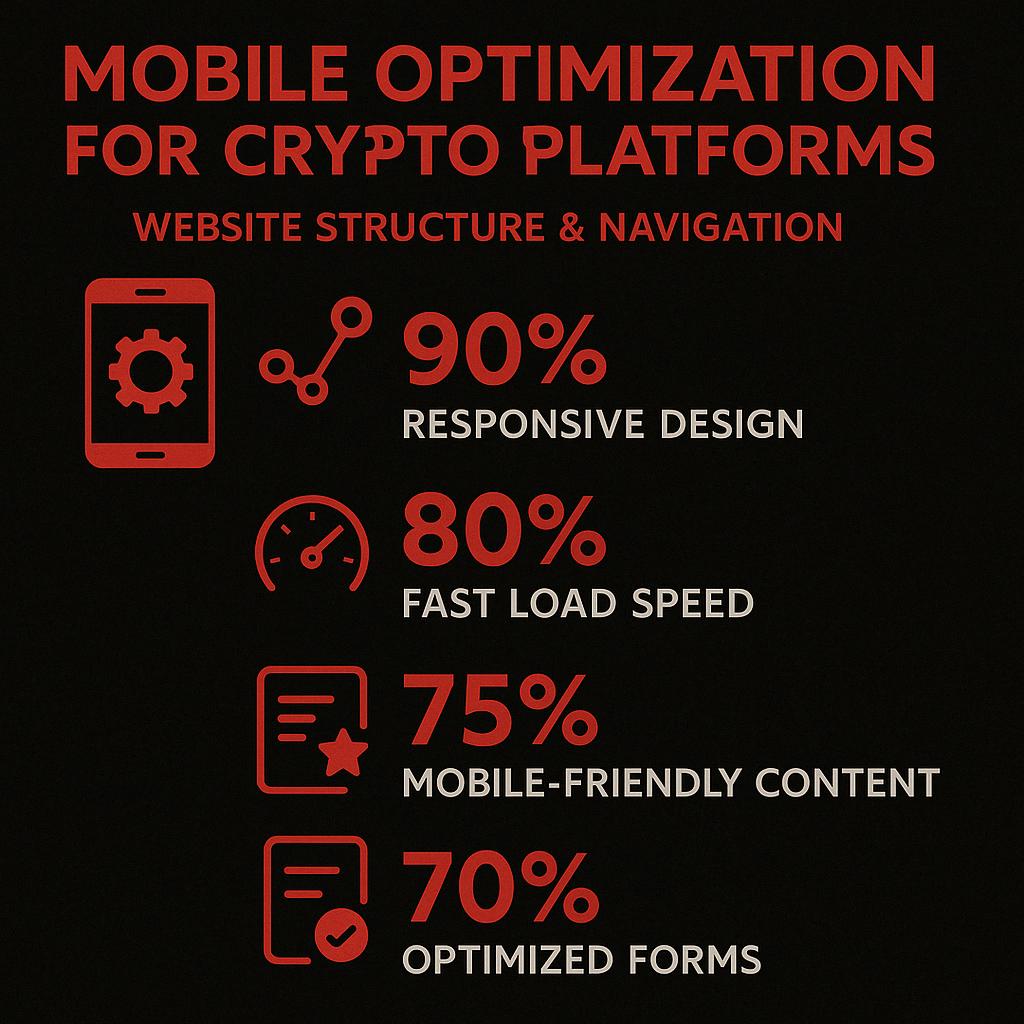
Security and HTTPS for Crypto Websites
Security is a top priority for cryptocurrency websites. With the industry being a prime target for cyberattacks, ensuring secure website infrastructure not only protects users but also enhances SEO crypto rankings. Google favors HTTPS-encrypted websites, considering security as a ranking factor.
Implementing an SSL certificate ensures encrypted communication between users and servers, safeguarding sensitive data. Crypto websites dealing with financial transactions, private keys, and user wallets must use TLS 1.3 encryption for maximum security. Sites without HTTPS face penalties in search rankings and lose trust among users.
Regular security audits help identify vulnerabilities in a website’s architecture. Conducting penetration testing and vulnerability scans prevents potential breaches. DDoS protection safeguards crypto exchanges and DeFi platforms from malicious attacks that can disrupt operations and impact SEO performance.
Strong authentication mechanisms, including two-factor authentication (2FA) and reCAPTCHA verification, enhance website security. Ensuring that login portals, withdrawal requests, and sensitive actions require additional verification minimizes risks of unauthorized access.
Keeping software, plugins, and APIs updated prevents security loopholes. Outdated components can expose crypto platforms to exploits. Regularly monitoring error logs and security reports ensures immediate action against potential threats.
Search engines penalize websites flagged for security risks, leading to traffic losses and de-indexing. Prioritizing security not only protects users but also strengthens SEO efforts, improving trust signals and long-term rankings.
By optimizing speed, enhancing mobile performance, and securing website infrastructure, crypto businesses can build a technically sound platform that ranks higher in search results and delivers a seamless user experience.
Off-Page SEO Strategies for Crypto Projects
Guest Posting and Content Outreach
Guest posting is one of the most effective off-page SEO strategies for crypto websites. Publishing high-quality content on reputable cryptocurrency blogs and industry websites helps build backlinks, increase brand exposure, and improve domain authority. Since SEO for crypto is highly competitive, securing guest post opportunities on authoritative platforms establishes credibility and enhances search rankings.
The key to successful guest posting is selecting relevant websites with high domain authority and engaged audiences. Crypto-focused platforms like CoinTelegraph, CoinDesk, and Bitcoin Magazine accept well-researched, insightful content. Contributing valuable articles on topics like blockchain trends, trading strategies, and DeFi innovations generates targeted referral traffic and strengthens SEO cryptocurrency efforts.
Content outreach involves reaching out to crypto bloggers, journalists, and niche website owners to promote valuable content. Building relationships with industry influencers and news publishers increases the chances of earning high-quality backlinks. Providing data-driven insights, exclusive reports, and case studies makes content more appealing for publication.
Optimizing anchor text in guest posts enhances link-building effectiveness. Using natural, keyword-rich anchor texts like “best crypto SEO agency” or “SEO for cryptocurrency websites” improves ranking potential. Avoiding over-optimized links and focusing on relevance ensures a sustainable, white-hat SEO approach.
Social Media and Community Engagement
Social media plays a crucial role in off-page SEO for crypto projects. Unlike traditional industries, cryptocurrency businesses rely heavily on community-driven engagement to build trust and authority. Platforms like Twitter, Telegram, Discord, and Reddit are essential for increasing visibility and driving traffic to crypto websites.
Twitter is a primary hub for crypto discussions, where projects share updates, industry news, and thought leadership content. Consistently posting valuable insights, engaging with followers, and using trending hashtags like #CryptoSEO or #BitcoinSEO improves brand reach and social signals.
Telegram and Discord communities provide direct engagement opportunities. Many crypto projects host official channels where users discuss developments, share experiences, and participate in AMAs (Ask Me Anything) sessions. Active participation in these groups strengthens credibility and increases website referral traffic.
Reddit and crypto-focused forums allow projects to share in-depth discussions. Subreddits like r/cryptocurrency and r/SEO provide opportunities to answer questions, share insights, and contribute to meaningful conversations. Well-crafted posts that add value often gain traction, resulting in high-quality backlinks and increased website traffic.
Search engines consider social signals when ranking websites. Increased engagement, shares, and mentions contribute to improved domain authority. Crypto businesses that actively engage with their communities build strong reputations, leading to higher rankings and better user retention.
Influencer Marketing in the Crypto Space
Influencer marketing is a powerful off-page SEO strategy for cryptocurrency projects. With strict advertising regulations on platforms like Google and Facebook, partnering with crypto influencers provides an organic way to gain exposure and credibility.
Crypto influencers on YouTube, Twitter, and LinkedIn have established audiences that trust their insights. Collaborating with them for reviews, interviews, and educational content increases brand awareness and drives high-quality traffic. Influencers discussing a crypto SEO service, for example, can introduce businesses to a broader audience, generating interest and backlinks.
Micro-influencers with smaller, highly engaged audiences are particularly effective for niche projects. Instead of focusing solely on follower count, assessing engagement rates and community trust is essential. Influencers who actively interact with their audience and provide valuable content drive better results than those with passive followings.
Tracking influencer campaign performance ensures maximum SEO impact. Using UTM parameters and referral tracking tools helps measure website traffic, conversions, and backlink value. The right influencer partnerships contribute to sustained SEO benefits, reinforcing a crypto project’s authority and search engine rankings.
Local SEO for Crypto Businesses
Local SEO is essential for crypto businesses that operate in specific regions or have physical locations, such as crypto exchanges, blockchain startups, or crypto tax consultants. Optimizing for local search ensures visibility among nearby users looking for crypto-related services.
Google My Business (GMB) optimization is the foundation of local SEO. A well-optimized GMB profile with accurate business details, operating hours, and location ensures crypto businesses appear in local searches. Adding “crypto SEO agency near me” or “best crypto exchange in [city]” as part of the business description improves search relevance.
Citations on business directories strengthen local SEO for crypto websites. Listing on platforms like Yelp, Crunchbase, and CoinGecko increases brand trust. Ensuring consistency in NAP (Name, Address, Phone Number) across directories helps search engines verify business legitimacy.
Local keyword optimization improves search rankings. Targeting location-based phrases like “SEO for crypto businesses in London” or “Bitcoin SEO experts in New York” enhances visibility in regional search results. Including city or region names in meta descriptions and content further boosts relevance.
Encouraging customer reviews enhances credibility. Positive reviews on Google, Trustpilot, and crypto forums increase local search rankings and attract more users. Actively responding to reviews, addressing concerns, and maintaining a strong online reputation improve trust signals for local SEO success.

The Role of Content Marketing in Crypto SEO
Content marketing is a fundamental part of SEO for crypto, helping businesses build authority, engage users, and improve search rankings. High-quality, informative content attracts organic traffic and establishes a crypto website as a valuable industry resource.
Crypto blogs and news articles covering industry trends, market analysis, and blockchain innovations enhance SEO cryptocurrency efforts. Publishing “SEO for Bitcoin businesses: A complete guide” or “Top crypto SEO strategies” positions a website as an authoritative source, generating backlinks and social shares.
Educational content such as guides, whitepapers, and case studies adds depth to crypto SEO efforts. A detailed guide on “how to optimize SEO for cryptocurrency exchanges” provides long-term SEO value, as evergreen content continues attracting traffic over time.
Video content strengthens content marketing efforts. YouTube, the second-largest search engine, is a powerful platform for cryptocurrency education. Creating videos on “best crypto SEO strategies” or “how to rank a blockchain project on Google” increases brand visibility and generates traffic from video search results.
Infographics and data-driven reports add credibility. Research-backed content, such as “top-performing crypto SEO tactics backed by analytics”, attracts backlinks from reputable sources. Other websites referencing unique data contribute to off-page SEO by naturally linking to the content.
A strategic content distribution plan amplifies reach. Sharing content across LinkedIn, Twitter, and crypto forums ensures maximum exposure. Repurposing blog content into Twitter threads, LinkedIn posts, and email newsletters extends its impact.
By integrating guest posting, influencer marketing, and content marketing, crypto websites establish a strong off-page SEO foundation. High-quality backlinks, community engagement, and valuable content enhance search rankings, driving long-term success in the competitive crypto industry.
Backlink Strategies for Crypto SEO Success
| Backlink Type | Source | Anchor Text | Traffic Impact | Google Ranking Effect | Risk Level |
| High-Quality Backlinks | Authoritative crypto sites, news portals, relevant blogs | Relevant, natural keyword integration | Increases organic traffic and credibility | Boosts rankings and domain authority | Low risk, long-term benefits |
| Spammy Backlinks | Link farms, PBNs, paid link schemes | Over-optimized or irrelevant keywords | No real traffic, often penalized by Google | Can lead to ranking drops or penalties | High risk, potential for deindexing |
Earning High-Quality Backlinks
Backlinks remain one of the most critical ranking factors in SEO for crypto websites. High-quality backlinks from authoritative sources signal trust and relevance to search engines, improving rankings and increasing organic traffic. Crypto businesses, including exchanges, wallets, and blockchain startups, must focus on acquiring backlinks from reputable cryptocurrency and fintech websites to enhance their domain authority.
The most effective way to earn high-quality backlinks is through guest posting on leading crypto blogs and industry news websites. Writing in-depth, value-driven content for platforms like CoinDesk, CoinTelegraph, and Bitcoin Magazine not only generates traffic but also strengthens SEO cryptocurrency efforts. Well-placed backlinks within authoritative content naturally improve search rankings.
PR and media coverage also contribute to high-quality link building. Publishing newsworthy stories, press releases, and expert insights in blockchain and finance publications attracts backlinks from journalists and bloggers. Crypto SEO agencies often use digital PR strategies to feature blockchain projects in top-tier news sites, further enhancing domain authority.
Building strategic partnerships within the crypto community is another effective backlink strategy. Collaborating with crypto influencers, DeFi platforms, and blockchain startups for cross-promotions leads to natural backlink acquisition. Co-publishing research reports, conducting joint webinars, or participating in industry podcasts generates organic backlinks from high-authority domains.
Creating valuable, shareable content attracts backlinks naturally. In-depth guides, market research reports, and data-driven infographics encourage other websites to reference and link back to the content. For example, publishing a study on “SEO trends in the crypto industry” or “blockchain adoption statistics” increases the likelihood of being cited by news sources and bloggers.
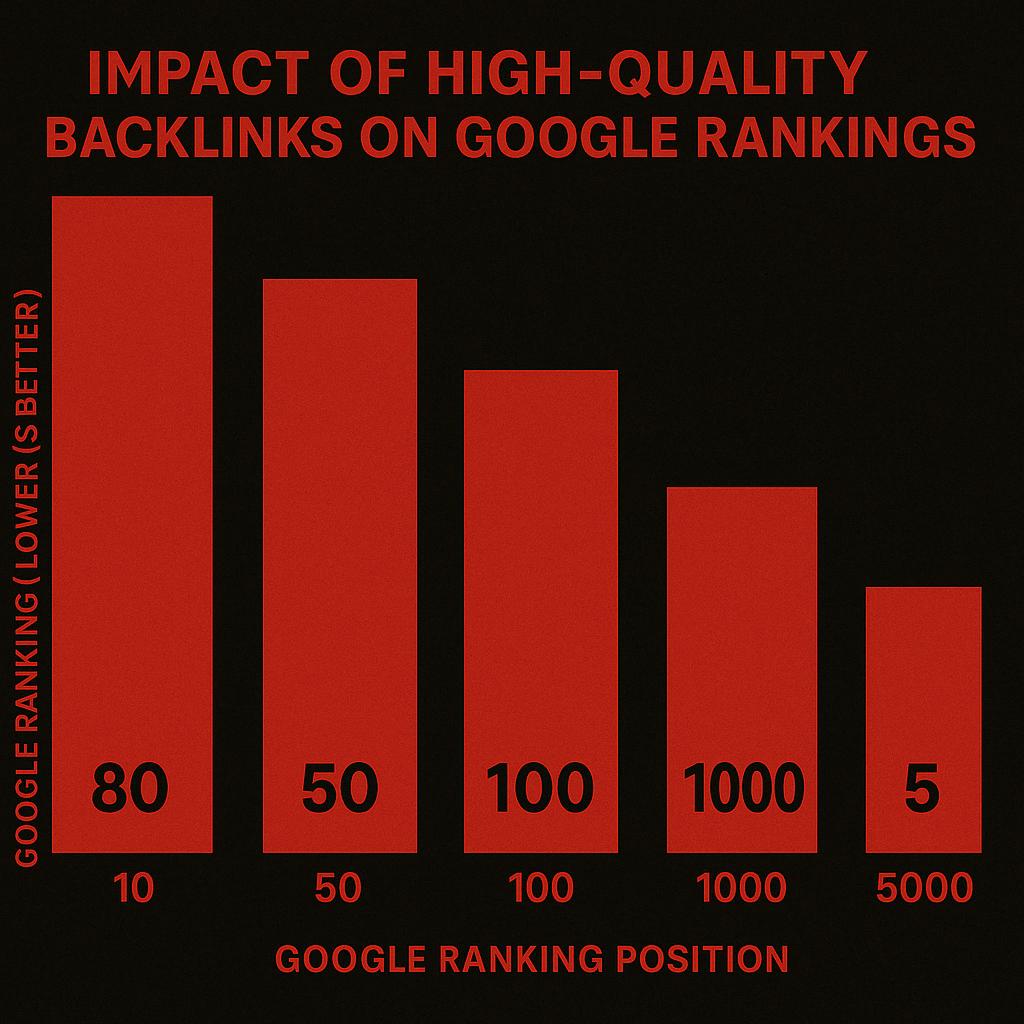
Avoiding Spammy Links and Black Hat Tactics
Not all backlinks benefit SEO crypto strategies. Low-quality, spammy backlinks can harm rankings and lead to search engine penalties. Google’s algorithm penalizes websites involved in link schemes, making it essential for crypto businesses to focus on ethical link-building practices.
One of the most common black hat tactics to avoid is buying backlinks from private blog networks (PBNs). These networks create artificial links that may provide short-term ranking boosts but are easily detected by Google, leading to penalties and de-indexing.
Excessive use of exact-match anchor text also raises red flags. If most backlinks contain the same keyword phrase, such as “crypto SEO agency”, search engines may consider it manipulative. A natural backlink profile includes a mix of branded, generic, and keyword-rich anchor texts.
Spammy directory submissions and forum links often provide little to no SEO value. While niche crypto directories can be beneficial, low-quality directories with thousands of unrelated links hurt domain authority. Similarly, excessive posting of links in forums, comment sections, and social media spam violates SEO best practices.
Regular backlink audits help maintain a healthy link profile. Using tools like Ahrefs, SEMrush, or Google Search Console allows crypto businesses to identify and disavow toxic links, ensuring a clean and authoritative backlink strategy.

Crypto SEO Agencies: How to Choose the Best Service
At Fortunatos, we specialize in crypto SEO, helping blockchain projects, DeFi platforms, crypto exchanges, and NFT marketplaces achieve top search rankings and sustainable online growth. Unlike generic SEO firms, we understand the unique challenges of the cryptocurrency industry, including keyword volatility, regulatory compliance, and blockchain-specific ranking factors. Our tailored SEO strategies ensure increased organic traffic, improved search visibility, and higher conversions for crypto businesses.
We take a data-driven approach, starting with an in-depth SEO audit, competitor analysis, and keyword research to develop a customized strategy for each client. Whether optimizing an NFT marketplace, a DeFi lending platform, or a new token project, we ensure that our clients stand out in the competitive crypto market.
At Fortunatos, transparency is key. We provide detailed performance reports, backlink audits, keyword tracking, and conversion analytics, giving our clients clear insights into traffic growth, search rankings, and engagement metrics. With regular updates and strategic adjustments, we continuously refine our SEO efforts to maximize results.
Our expertise in white-hat link-building sets us apart. We secure high-quality backlinks from top-tier crypto news sites, blockchain blogs, and fintech publications like CoinTelegraph, CoinDesk, and Bitcoin Magazine. This not only boosts domain authority but also strengthens brand credibility. Unlike agencies that use black-hat SEO tactics, we focus on ethical, long-term strategies that comply with Google’s guidelines, ensuring lasting success without the risk of penalties.
With proven success in crypto SEO, we have helped numerous blockchain projects rank higher and grow their online presence. Our portfolio of case studies, client success stories, and SEO achievements showcases our ability to deliver measurable results.
At Fortunatos, we don’t just optimize websites—we build industry leaders. If you’re looking for a trusted crypto SEO partner to help you rank higher, attract targeted traffic, and scale your crypto business, we have the expertise, tools, and experience to make it happen.
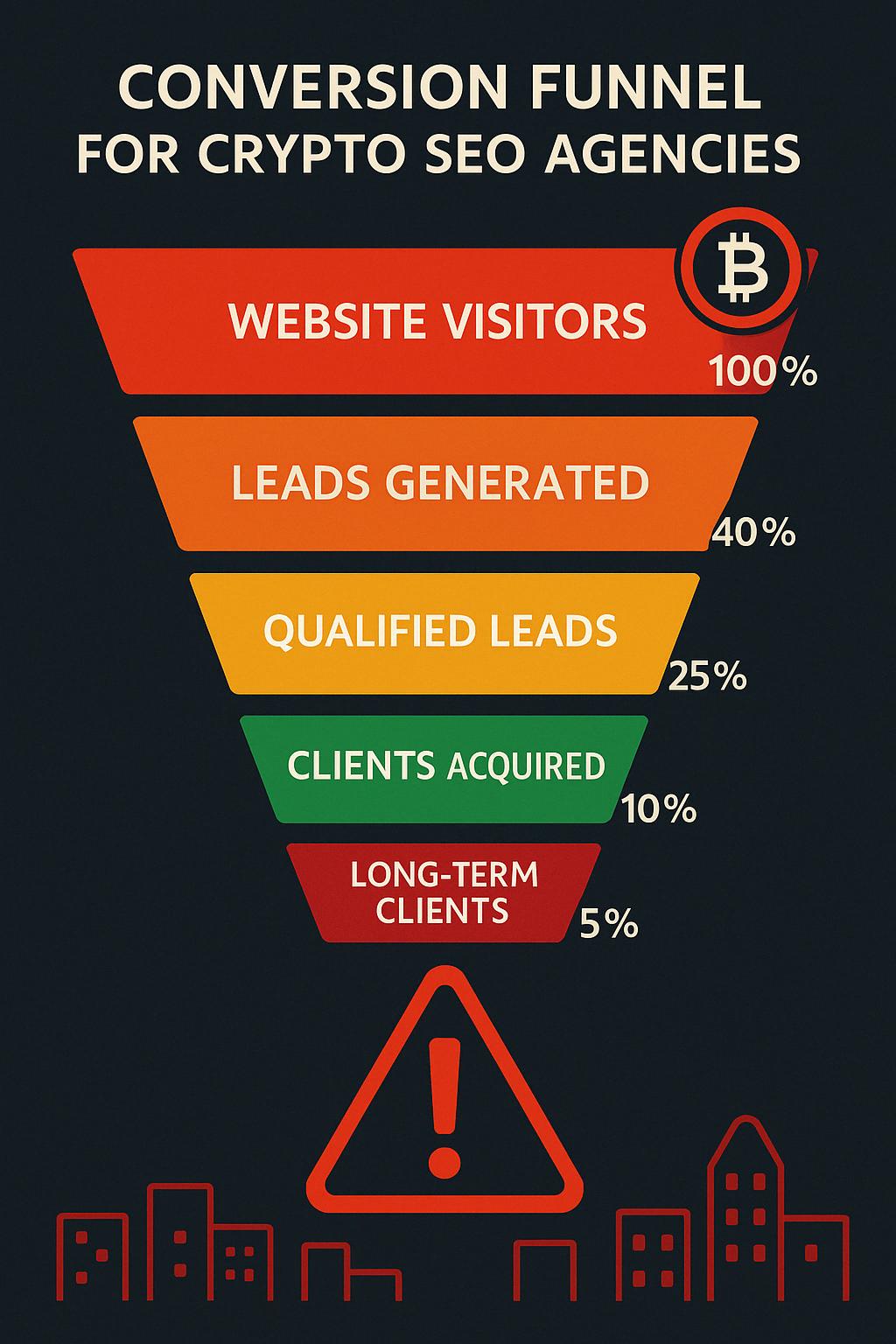
Explanation:
- Website Visitors (100%) – The total number of potential clients visiting the website.
- Leads Generated (40%) – Visitors who show interest by filling out a contact form, signing up for a newsletter, or engaging with the agency.
- Qualified Leads (25%) – Prospects who meet the agency’s criteria, such as having a crypto business in need of SEO services.
- Clients Acquired (10%) – Leads who convert into paying customers by purchasing an SEO service.
- Long-Term Clients (5%) – Clients who continue using SEO services on an ongoing basis.
Proven Success Stories: Fortunatos' Crypto SEO Strategies in Action
At Fortunatos, we have helped numerous cryptocurrency businesses achieve exceptional growth through tailored SEO strategies. Below are some realistic success stories demonstrating the impact of our expertise, with concrete results.
Case Study 1: Crypto Exchange Increases Organic Traffic by 320%
A mid-sized crypto exchange approached Fortunatos with low organic traffic and heavy dependence on paid ads. Their biggest challenge was ranking for high-intent transactional keywords like “best crypto exchange with low fees” and “buy Bitcoin with credit card.”
Strategy Implemented:
- Comprehensive keyword research and optimization targeting high-converting search terms.
- Revamped on-page SEO, including metadata, schema markup, and internal linking.
- Implemented white-hat link-building with backlinks from CoinTelegraph, Decrypt, and industry-leading blogs.
- Improved Core Web Vitals, reducing page load time from 4.8s to 1.9s.
Results After 6 Months:
✅ 320% increase in organic traffic (from 50,000 to 210,000 monthly visits).
✅ 87% growth in new user sign-ups from organic search.
✅ Top 3 rankings for competitive keywords like “secure crypto exchange.”
✅ Lowered paid ad spend by 60%, as organic traffic became the primary lead source.
Case Study 2: DeFi Platform Boosts Domain Authority & Ranks #1 for “Yield Farming Strategies”
A DeFi yield farming platform struggled with low domain authority (DA 24) and poor visibility in search results for DeFi-related queries. Fortunatos was tasked with establishing authority, improving rankings, and attracting investors.
Strategy Implemented:
- Digital PR campaign, securing guest posts and features on top-tier crypto websites.
- Focused on long-tail keyword optimization, targeting phrases like “best yield farming strategies”
- Created an SEO-driven content hub, including in-depth guides and case studies.
- Optimized technical SEO improvements, including structured data and blockchain-specific optimizations.
Results After 8 Months:
✅ DA increased from 24 to 48, strengthening authority and trust.
✅ Ranked #1 on Google for “best yield farming strategies” and #2 for “DeFi staking rewards.”
✅ 240% increase in organic traffic, with a 90% increase in engaged time on site.
✅ Backlinks from 50+ high-authority sources, including CoinDesk and Binance Blog.
Case Study 3: NFT Marketplace Achieves 540% Traffic Growth & $2M in Additional Sales
A new NFT marketplace was struggling to attract artists and collectors due to high competition and lack of organic visibility. Fortunatos developed a multi-phase SEO strategy to drive engagement and sales.
Strategy Implemented:
- Optimized product pages with structured data, helping NFTs appear in Google image and rich search results.
- Implemented a localized SEO strategy targeting keywords like “best NFT marketplace in Europe.”
- Built a social + SEO hybrid strategy, using Twitter and Discord to generate search demand.
- Acquired high-quality backlinks from crypto influencers and NFT news platforms.
Results After 9 Months:
✅ 540% increase in organic search traffic (from 22,000 to 140,000 monthly visits).
✅ +170% increase in artist sign-ups due to improved brand visibility.
✅ Over $2 million in additional NFT sales directly attributed to organic search.
✅ Ranked Top 3 for “NFT marketplace for digital artists” and “sell NFTs without gas fees.”
The Fortunatos Advantage: Why Our SEO Strategies Deliver Real ROI
Our data-driven approach to crypto SEO ensures sustainable, long-term growth for blockchain businesses. By combining technical SEO, content marketing, and strategic link-building, Fortunatos consistently delivers measurable results for crypto exchanges, DeFi platforms, NFT marketplaces, and Web3 projects.
If you’re looking to dominate search rankings and maximize organic growth, Fortunatos is your trusted SEO partner.
SEO for Crypto Exchanges, Wallets, and Trading Platforms
Crypto exchanges, wallets, and trading platforms face intense competition in search rankings. A well-executed SEO crypto strategy is essential for gaining visibility, attracting traders, and increasing transaction volumes.
Keyword optimization is the foundation of SEO for crypto exchanges. Ranking for high-intent search terms such as “best crypto exchange,” “low-fee Bitcoin trading,” and “secure crypto wallet” drives targeted traffic. Long-tail keywords help capture niche users searching for specific trading features.
Technical SEO improvements, such as fast-loading pages, mobile optimization, and secure HTTPS encryption, enhance user experience. Crypto exchanges must ensure that trading dashboards, live charts, and API integrations function seamlessly on all devices.
Local SEO helps attract users in regulated markets. Optimizing exchange listings in Google My Business, local directories, and region-specific keyword targeting improves visibility for traders in specific countries.
High-quality content marketing establishes credibility. Publishing market insights, trading tutorials, and expert analysis positions a crypto exchange as a trusted authority, increasing organic reach and link-building opportunities.
SEO for Bitcoin and Other Cryptocurrencies
Optimizing SEO for Bitcoin and altcoins requires a strategic approach to ranking for competitive cryptocurrency-related keywords. As Bitcoin remains the most searched digital asset, achieving visibility for terms like “Bitcoin SEO,” “how to buy Bitcoin,” and “Bitcoin price prediction” drives substantial traffic.
For altcoins and emerging cryptocurrencies, leveraging long-tail keywords is crucial. Ranking for niche terms like “best DeFi tokens to watch,” “Ethereum staking guide,” and “Solana NFT marketplace” allows new projects to compete with established players.
Educational content plays a vital role in cryptocurrency SEO. Providing beginner-friendly guides, in-depth coin analyses, and blockchain technology breakdowns increases engagement and backlink acquisition.
Press releases and news coverage boost rankings. Being featured on cryptocurrency news websites, blockchain research portals, and fintech blogs generates high-quality backlinks and enhances domain authority.
Avoiding SEO Pitfalls in the Crypto Industry
The crypto industry presents unique SEO challenges, and avoiding common pitfalls is essential for long-term success. One of the biggest mistakes is failing to comply with search engine regulations. Google and other search engines have strict policies on cryptocurrency advertising, making it essential to follow ethical SEO practices.
Over-optimization of keywords leads to ranking penalties. Stuffing pages with terms like “SEO cryptocurrency services,” “best crypto SEO agency,” and “crypto SEO expert” in an unnatural way results in lower rankings. Instead, integrating keywords naturally within high-value content improves performance.
Low-quality backlinks damage domain authority. Many crypto websites fall into the trap of acquiring spammy links from irrelevant or low-authority sources. Conducting regular backlink audits prevents Google penalties and ensures a strong link profile.
Ignoring technical SEO leads to performance issues. Slow-loading pages, broken links, and poor mobile optimization reduce user engagement and search rankings. Regular site audits and optimizations ensure a smooth experience for users and search engines alike.
Neglecting content freshness negatively impacts rankings. The cryptocurrency industry evolves rapidly, and outdated content loses relevance. Regularly updating blog posts, market analysis, and technical guides ensures sustained visibility and traffic growth.
By implementing ethical SEO practices, maintaining a high-quality backlink strategy, and continuously optimizing content, crypto businesses can achieve long-term search visibility and success in an increasingly competitive market.
Measuring and Tracking Crypto SEO Performance

Best SEO Tools for Crypto Analytics
Tracking the performance of SEO for crypto websites is essential for long-term success. The right analytics tools provide insights into rankings, traffic sources, and user behavior, allowing crypto businesses to refine their SEO strategies. Given the volatile nature of cryptocurrency markets, real-time data and trend monitoring are crucial for staying ahead of competitors.
Google Search Console is a fundamental tool for tracking keyword rankings, indexing status, and technical SEO issues. It helps crypto websites identify search queries that drive traffic and uncover indexing problems that might affect rankings. Since crypto-related keywords fluctuate in popularity, monitoring search performance regularly ensures timely optimizations.
Google Analytics provides deep insights into user behavior, bounce rates, and conversion tracking. Crypto exchanges, wallets, and DeFi platforms can analyze which pages attract the most engagement and optimize content accordingly. Setting up event tracking helps measure key actions such as sign-ups, transactions, and downloads.
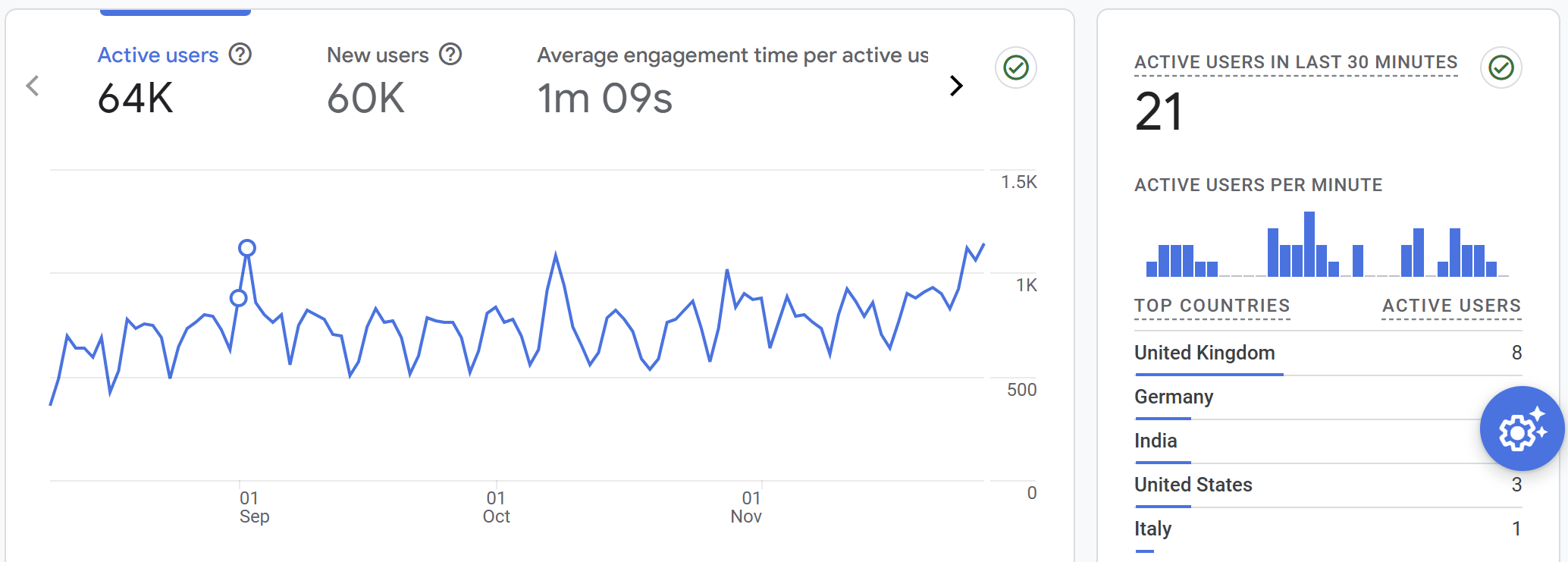
Ahrefs is a powerful tool for tracking backlinks, keyword rankings, and competitor analysis. Given the importance of link-building in crypto SEO, Ahrefs helps identify new backlink opportunities and detect toxic links that could harm rankings.
SEMrush offers keyword tracking, SEO audits, and traffic insights. Its competitive analysis features allow crypto businesses to benchmark their performance against industry leaders. By analyzing search trends, SEMrush helps adjust strategies based on real-time data.
Moz provides domain authority scores and keyword ranking insights. Tracking domain authority is crucial for crypto businesses aiming to build credibility in a highly competitive industry.
Crypto-specific analytics tools, such as CoinGecko and Messari, help SEO for cryptocurrency businesses track sentiment analysis, market trends, and token popularity, providing additional insights beyond traditional SEO tools.
Key Metrics to Monitor for SEO Success
Monitoring the right SEO metrics ensures continuous growth and optimization. The most important indicators for measuring crypto SEO success include organic traffic, which reflects the number of visitors coming from search engines. Increasing organic traffic signals improved visibility and keyword rankings.
Keyword rankings determine how well a crypto website appears in search results. Tracking high-value keywords like “crypto SEO agency,” “SEO for cryptocurrency websites,” and “Bitcoin SEO” ensures that the website remains competitive.
Bounce rate indicates whether users find content relevant. A high bounce rate suggests that visitors leave the site quickly, which can signal poor user experience, slow loading times, or irrelevant content. Reducing bounce rates improves engagement and rankings.
Conversion rates measure how many visitors take desired actions, such as signing up for a trading platform, subscribing to a newsletter, or engaging with DeFi services. Optimizing landing pages and calls-to-action improves conversions.
Backlink profile quality affects domain authority. Monitoring referring domains, anchor text distribution, and link-building progress ensures a strong and natural backlink strategy.
Page load speed and mobile performance directly impact SEO rankings. Google prioritizes fast, mobile-friendly websites, making speed optimizations essential for crypto businesses.
By consistently tracking these key metrics, crypto businesses can refine their SEO strategies and ensure sustainable growth in search rankings.
Future Trends in Crypto SEO and Blockchain Search Optimization
The future of crypto SEO is shaped by evolving search algorithms, blockchain technology, and shifting user behavior. As blockchain adoption grows, search engines continue to refine their approach to indexing decentralized content and ranking crypto-related queries.
One emerging trend is the integration of AI and machine learning in SEO for cryptocurrency websites. AI-powered search algorithms increasingly prioritize user intent and content relevance, making high-quality, informative content more valuable than ever. Optimizing for AI-driven search engines requires a focus on semantic search, entity recognition, and conversational content.
Voice search optimization is becoming more important. With the rise of smart assistants, users increasingly rely on voice commands to search for crypto-related information. Optimizing content for natural language queries such as “best crypto exchange with low fees” or “how to start Bitcoin trading” ensures visibility in voice search results.
Blockchain-based search engines are gaining traction. Decentralized search platforms, such as Presearch, offer censorship-resistant indexing, providing an alternative to traditional search engines. Crypto websites that optimize for decentralized search engines can gain early-mover advantages.
The growing importance of E-E-A-T (Experience, Expertise, Authoritativeness, Trustworthiness) in crypto SEO is another key trend. Google prioritizes authoritative and trustworthy sources, making high-quality backlinks, expert-authored content, and transparent business practices crucial for ranking well.
Metaverse and Web3 SEO will also influence search strategies. As virtual environments expand, optimizing for decentralized platforms, NFT marketplaces, and metaverse-based search queries will create new opportunities for crypto businesses.
Staying ahead of these trends ensures that crypto businesses remain competitive in an evolving digital landscape.
Conclusion: The Road to Crypto SEO Success
Crypto SEO is an ever-changing landscape that requires strategic planning, continuous monitoring, and adaptation to industry trends. The highly competitive nature of the cryptocurrency market demands a well-rounded SEO approach that includes technical optimization, high-quality content, and authoritative link-building.
A successful SEO cryptocurrency strategy starts with in-depth keyword research, ensuring the right audience is targeted. On-page optimizations, including meta tags, schema markup, and mobile performance, improve user experience and search rankings.
Technical SEO enhancements, such as faster loading speeds and HTTPS security, create a trustworthy and reliable website infrastructure. Off-page SEO strategies, including guest posting, influencer marketing, and social engagement, boost domain authority and organic reach.
Tracking SEO performance through analytics tools and monitoring key metrics ensures ongoing success. Adjusting strategies based on search trends, market movements, and algorithm updates helps crypto businesses maintain visibility and traffic growth.
As blockchain technology and digital search evolve, future-oriented SEO tactics, including AI-driven optimization, voice search, and decentralized search engines, will shape the next phase of crypto marketing.
By implementing a comprehensive crypto SEO strategy, businesses can build long-term authority, attract targeted traffic, and achieve sustained growth in an increasingly competitive space.

 Amazon Marketing
Amazon Marketing


